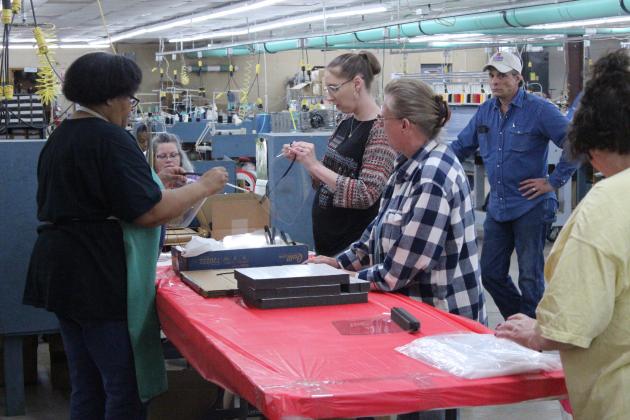Local manufacturer to produce equipment for healthcare providers
Stanco Safety Products in Atlanta, a major domestic provider of flame-resistant apparel, protective workwear, and industrial safety products with manufacturing capabilities in the United States, Mexico, China, and the Middle East, began production of hospital gowns and face shields this week to support healthcare providers in Cass and Bowie counties in response to the shortages they face amid the Coronavirus pandemic.
The company has prototyped gowns and face shields while waiting for shipments from suppliers of the needed materials to assemble and ship to facilities within both counties. Mark Stanley and Kevin Highland, owners of the company, said they are currently waiting for 2000 yards of material from Milliken & Co, an industrial manufacturer, needed to assemble the gowns that are slated to be in the facility on Tuesday.
“It comes from North Carolina, motor freight. We made up six yesterday with some sample fabrics and sent those to St. Michaels.”, Stanley said.
Wadley Regional Hospital in Texarkana has reached out to his company in hopes of receiving equipment as well.
When asked how the company was approached to aid in the pandemic, Highland said, “Two weeks ago, I got a call from South Carolina asking if we could get our hands on disposable clothing or masks or anything like that. We reached out to our contacts in China and he said he didn’t have anything.”
After some networking, Highland said they had found some face masks. Subsequently, Stanco was approached by Paulson Manufacturing, a face shield company in Temecula, Calif. Because of the emergency and lack of protective equipment, Paulson is circumventing the usual chain of supply to work directly with companies like Stanco instead of through distributors, and Stanco will ship the finished product to healthcare providers, directly.
“They [Paulson] do a program with us called OEM which is products only available to manufacturers. There are four of us that can get this from them and nobody else can.”
Paulson has shipped the components of the face shields to be assembled at the Stanco facility which should deliver Friday. Stanley said that Paulson approached Stanco because of their bar-tacking machine which increases the strength of small lengths of fabric by sewing on it, repeatedly as is the process for a belt loop or pocket opening. Once the face-shield materials are received from Paulson, three assembly lines will be needed along with three bar-tacking machines, and each line will have five workers.
Of the hospital gowns, Stanley said that they would produce hospital and surgical gowns. For healthcare workers, the garment is typically a non-woven disposable. However, the company will begin production on a reusable product that is woven and resistant to pathogens and will withstand 70 washes.
“The way it works is the bacteria and viruses get trapped in the fabric and it kills it. What happens is when you wash it with chlorine bleach it reactivates the chemical process. Washes the old out and the very next day, same thing, trap and kill bacteria and viruses. It fills up, you have to recharge it, like your cell phone. It’ll be 70 times before that chemical process is washed out.”, Stanley said.
The finished face shields will be distributed wherever there is demand, but the surgical gowns will be exclusive to facilities within Bowie and Cass counties until local demand dissipates.
“We’re going to keep [gowns] in Bowie and Cass until they’re full until they’re all outfitted.”
Because of manufacturing capabilities, surgical gowns are dedicated to local providers, first. Stanley explained that hospital gowns for patients are assembled with ease, but surgical gowns are more complex and contain multiple components.
The company has produced 60 face shields so far and has delivered them to Genesis Primecare in Atlanta, free of charge.
In addition to healthcare, Stanco continues to serve other essential industries.
“We sell flame-resistant coveralls. They go to guys like Duncan Thompson who have to wear FR [flame resistant] when they’re taking fuel somewhere. That’s essential transportation of energy. Also, we make clothing for electricians and they wear these in power plants where there are super high voltages. Power plants are essential.”, said Stanley
For the protection of their staff, Stanley and Highland have implemented safety measures but hope to strengthen the protocol by checking employees for a temperature even before they enter the building once they receive a delayed shipment of forehead thermometers and requiring them to wash their hands before entering the production area. Fashioning the assembly lines with space recommendations made by the Center for Disease Control is currently underway.

